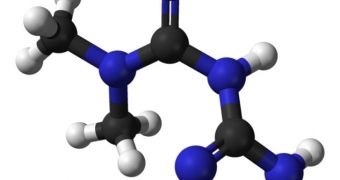According to a new series of studies, it would appear that the common type II diabetes drug metformin can be successfully used to prevent the development of tobacco-induced lung tumors.
The research team behind the investigation determined that the development of colorectal tumors can be inhibited by the drug as well.
Two new studies detailing the investigation appear in the latest issue of the esteemed journal Cancer Prevention Research, which is published by the American Association for Cancer Research (AACR).
The first investigation was conducted by experts at the National Cancer Institute. It revealed that mice exposed to the nicotine-derived nitrosamine called NNK were a lot less likely to develop tumors it they were administered metformin.
The drug was efficient regardless of how it was administered to the lab animals – through injections, or orally. When injected, its success rate was 72 percent. When taken orally, the rate decreased to between 40 and 50 percent.
At this point, the NCI team is considering beginning human trials, to assess whether the substance could be used as a prevention agent by those who smoke a lot.
Researchers in Japan showed in a second study that people taking metformin while not suffering from type II diabetes had a significantly lower rate of rectal aberrant crypt foci,
This is a substitute marker used to detect colorectal cancer, the science group says. On average, patients in the study group had 5.11 foci, compared to 7.56 for people in a control group.
“Although smoking cessation is the most important step for current smokers, over half of lung cancer cases are diagnosed in former smokers, raising the importance of identifying those at highest risk and identifying effective preventive treatments,” say Philip Dennis, MD, PhD.
He was the lead author of the first investigation, and he holds an appointment as a senior investigator at the NCI.
“This important laboratory study, together with prior laboratory and epidemiology research, suggests that metformin may be useful in cancer prevention and treatment,” Michael Pollak reveals.
“There is new information available about the mechanisms by which this drug, which is based on compounds present in lilac, may be useful for cancer control,” adds the expert, who is a professor in the department of medicine and oncology at the McGill University.

 14 DAY TRIAL //
14 DAY TRIAL //